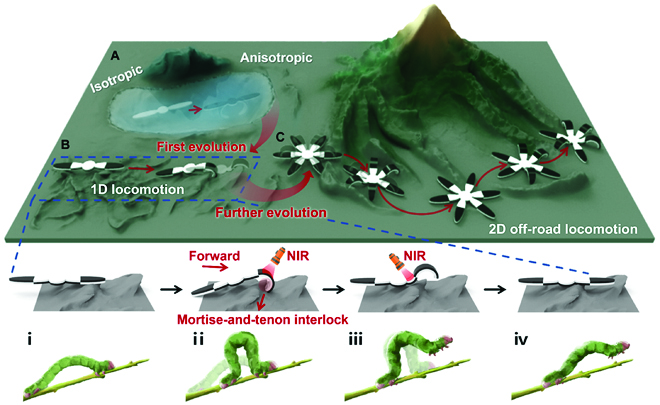The Smart Polymer Materials Group led by Prof. CHEN Tao at the Ningbo Institute of Materials Technology and Engineering (NIMTE) of the Chinese Academy of Sciences (CAS), in cooperation with Prof. ZHENG Yinfei at Zhejiang University, have developed a hydrogel-based soft robot with adaptive deformation, realizing multi-dimensional off-road locomotion on natural terrains.
This work was published in Research.
Under the vertical consideration of natural evolution, organisms have been capable to show versatile locomotion such as walking, crawling and swimming to adapt to change in the external environment. As an ideal candidate for biomimetic material, hydrogel can generate diverse biomimetic morphologies due to its excellent self-deformation and soft-tissue-like mechanical property. However, it remains challenging to activate this in-situ-deformation to autonomous locomotion and actuate multiple tasks.
Inspired by the self-growth and evolution of living organisms such as inchworms, a photothermal hydrogel layer containing Fe3O4 nanoparticles grew on the surface of the isotropic poly(N-isopropyl acrylamide) (PNIPAm) sponge, thus forming an anisotropic bilayer structure via interfacial diffusion polymerization.
Upon the programmed near-infrared light irradiation, the anisotropic configurations of the bilayer hydrogel were reconfigured and reassembled to adapt to the change in external environments, exhibiting multiple degrees of deformation and various morphologies.
By virtue of spatially programmed deformation, a mortise-and-tenon interlock was dynamically formed via the interaction between self-deformation and rough terrains, when the hydrogel actuator bent or recovered. Thus, the hydrogel actuator can imitate the crawling of inchworms to generate periodic propulsion, realizing the off-road locomotion on various artificial rough substrates and natural sandy terrains.
Benefiting from the adaptive deformation, the crawlable hydrogel actuators changed its volume and crawling mode with the synergy of every tentacle, thus adapt to the complex terrains including mountain pass, valley and ridge.
Based on the assembly of several hydrogel motors, even a static cargo was activated and crawled on the 2D rough substrate or overstep complex sandy terrains, showing bright and broad application prospects in the development of biomimetic mechanical discoloration devices.
This strategy sheds light on the design and development of soft robots, deformable materials and biomimetic devices.
This work was supported by the National Key R&D Program of China, the Zhejiang Provincial Natural Science Foundation of China, the Zhejiang Provincial Key R&D Program of China, the Youth Innovation Promotion Association of CAS, etc.







